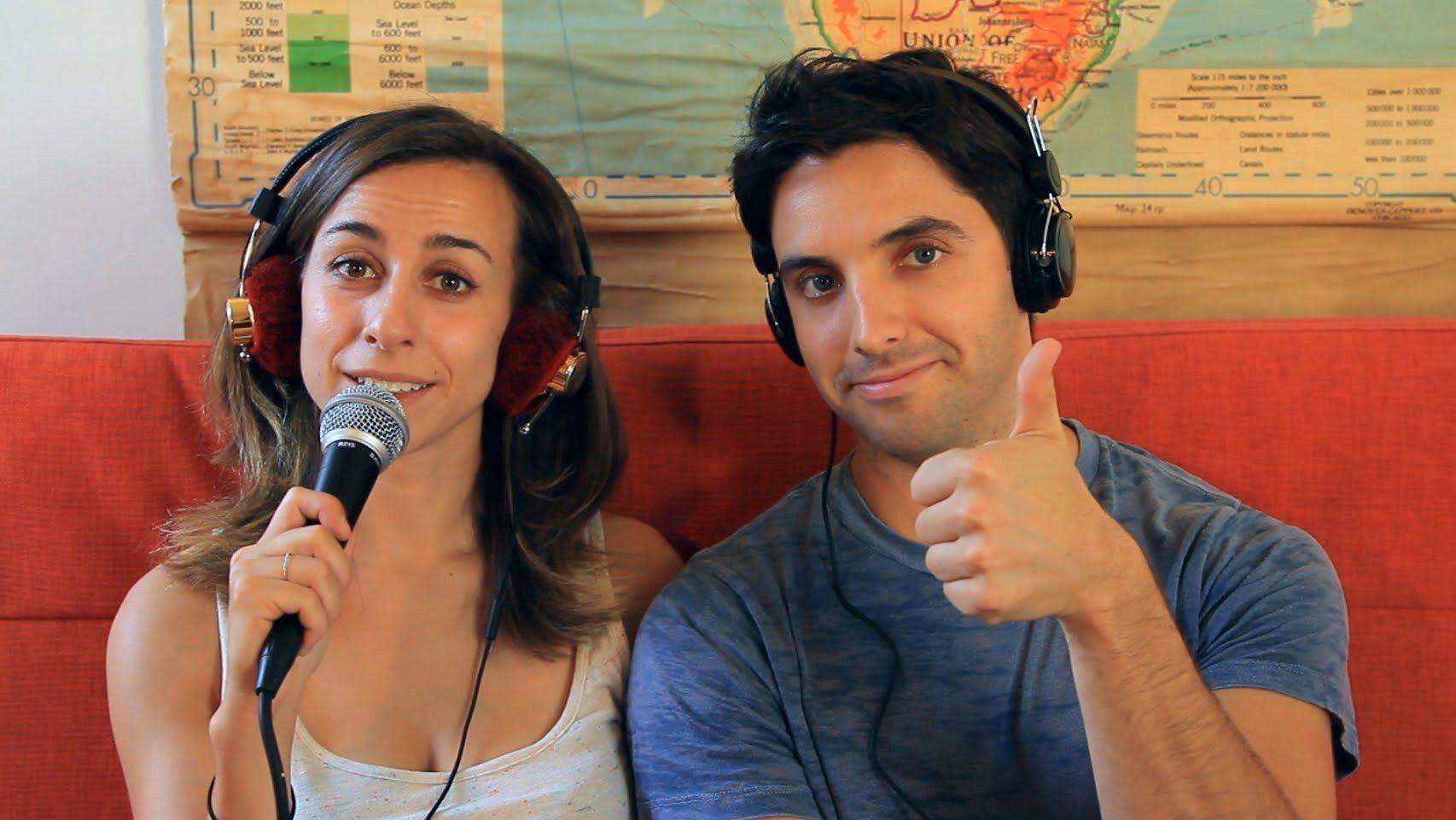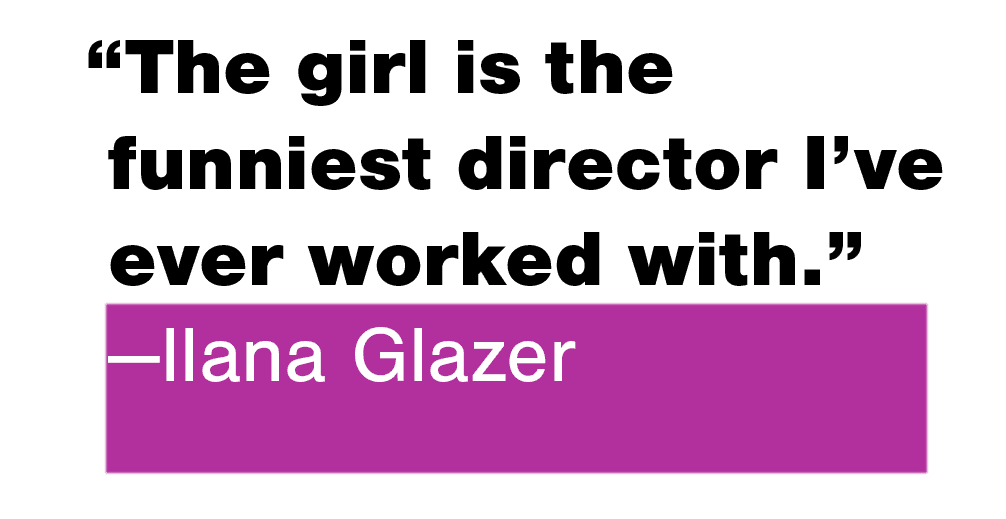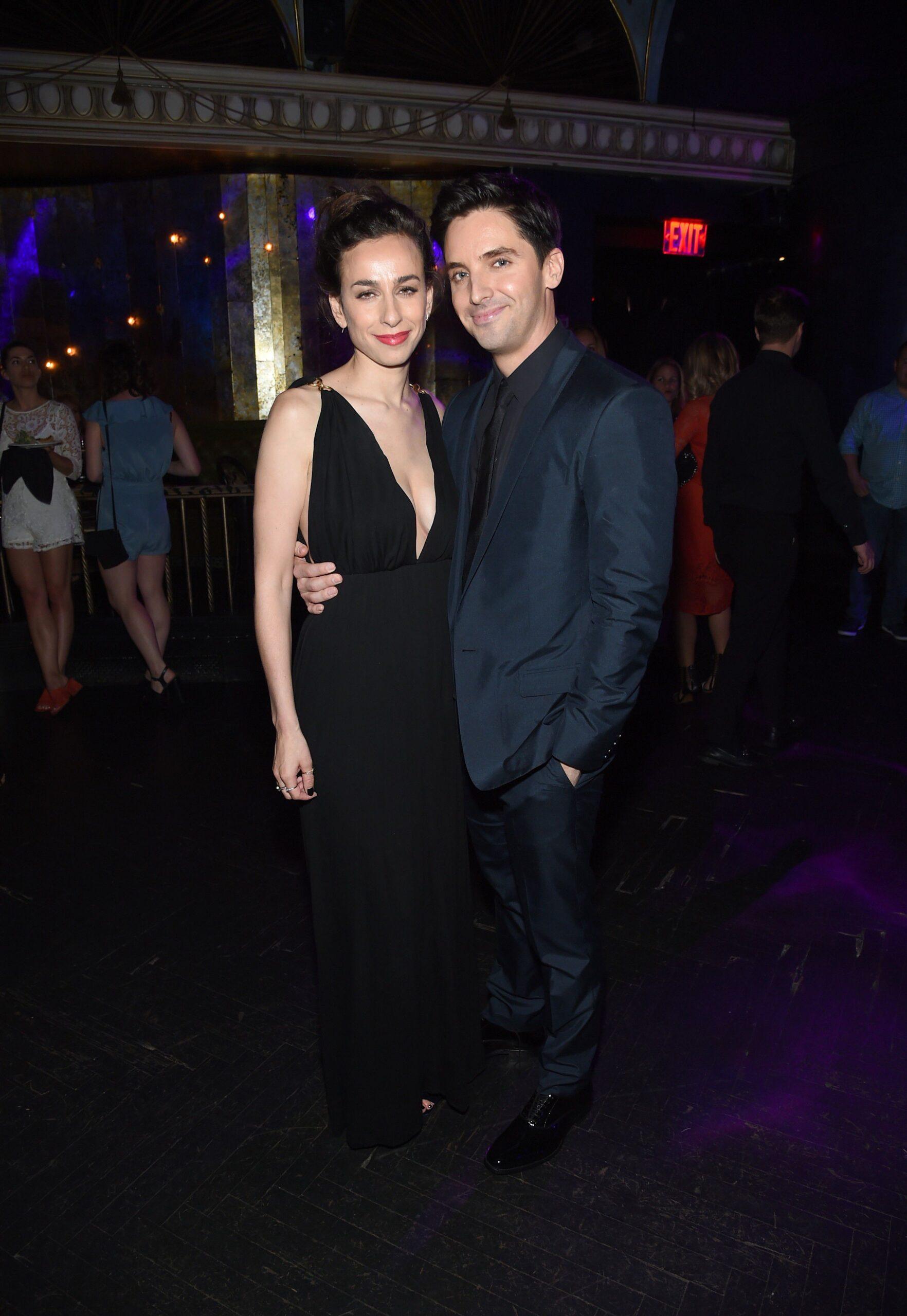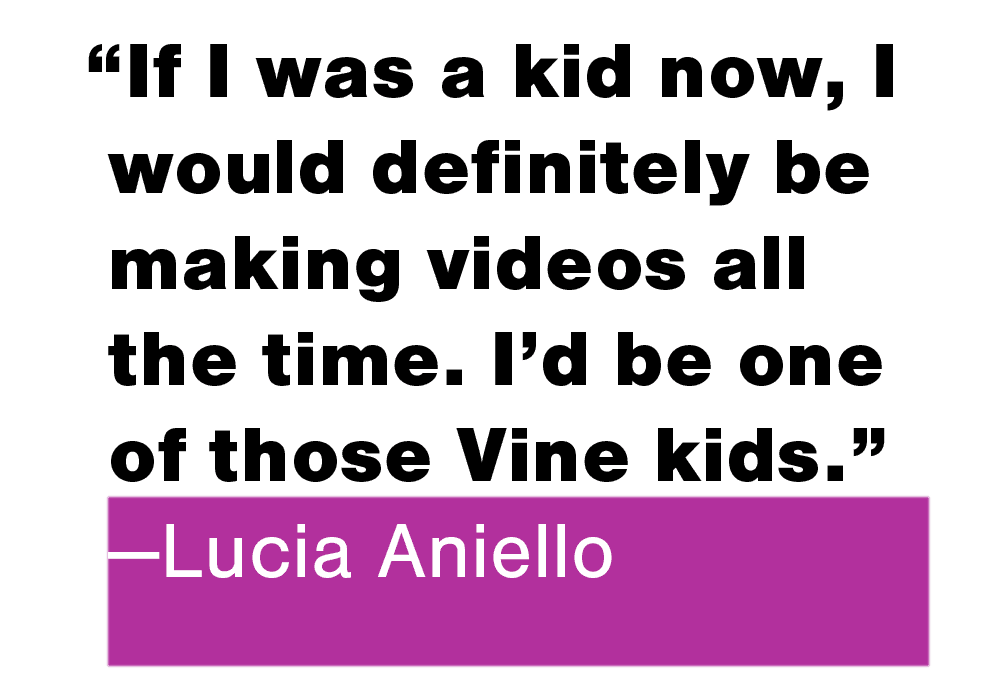On the set of her debut feature, Rough Night, 34-year-old Lucia Aniello — the first woman to direct an R-rated studio comedy in almost 20 years — could often be found kissing her shoulder. It’s a small, personal act of self-love, she explains to me over lunch one afternoon in early June, and she’s made a point to practice it throughout her career.
"You know that you are loved, right? By family, friends," Aniello says. "Well, there can be stressful moments when they’re not there, but you know that they would kiss you on the shoulder. So sometimes you just have to do it yourself, to be like, ‘You’re doing the best you can. You’re good enough.’" She cranes her neck and gives herself a loud smooch. "It comes in handy sometimes," she says. "Especially when you’re making a studio movie."
As one of the creative forces behind Comedy Central’s beloved Broad City, Aniello — along with her romantic and creative partner, Paul W. Downs (who plays the overzealous fitness instructor Trey on the show), and the series cocreators and stars, Abbi Jacobson and Ilana Glazer — have helped make space in modern comedy for a certain kind of unglamorous but self-sufficiently confident young heroine. (The show comes from a collaboratively personal place: Watch closely enough and, in the forthcoming fourth season, you just might catch Glazer’s imaginatively optimistic Ilana Wexler kissing her own shoulder, too.) The four comedians met about a decade ago while taking sketch and improv classes at the influential New York comedy school Upright Citizens Brigade, and Glazer says that Aniello’s background as a performer is a crucial part of why she’s so good at directing comedy.
"Lucia is a fucking genius," Glazer tells me. "The girl is the funniest director I’ve ever worked with. She pitches like she’s in the scene with you. She gives you what she would do if she were playing your role."
Former Workaholics regular Jillian Bell, who worked with Aniello for the first time on Rough Night, agrees. "Lucia is a brilliant maniac," she says. "She has such a specific voice, and I’m so excited that people are really taking to it and it’s getting out there in a huge studio comedy."
Broad City sprung from the depths of UCB — literally: Glazer met Aniello "in a back alley of a disgusting party" in a basement between a Gristedes and a McDonald’s; they were stoned and wearing identical outfits, which understandably blew their minds. The show’s early seasons had a scrappy, offbeat charm. Rough Night, though, is an entirely different beast: a slick studio comedy backed by Sony, made with a budget north of $20 million, and starring the highest-grossing actor of 2016, Scarlett Johansson.

"I come from a background of making things that, it feels like, are just for, like, five people," Aniello says, over a bowl of shakshuka at a Mediterranean restaurant. "Broad City and [the 2016 Comedy Central miniseries] Time Traveling Bong and a lot of the web stuff we’ve made, it feels like we’re making it for ourselves." Aniello and Downs had initially written Rough Night on spec, and constructed the story so that "if we just had to make it ourselves and got like half a million dollars for it, that we could still make it." That is not what ended up happening. Hot off the well-received second season of Broad City, the Rough Night script started a major studio bidding war; it finally landed at Sony in June 2015. Aniello says that, since the majority of the script had already been written, the tone of the film has stayed close to their original vision. "There wasn’t a large adaptation of our voice," she says. "But there was a certain amount of having to be cognizant of trying to make something for the masses. Which, I get it. You can’t make something that just a few people like if you’re spending $20 million and making a movie."
Rough Night is about four college friends who have drifted apart but reconvene in Miami for a bachelorette party gone horribly awry. Johansson plays the buttoned-up bride-to-be, Jess, and Downs plays her fiancé; Kate McKinnon plays Pippa, an Australian underachiever ("singer-songwriter’s the dream, party clown’s the reality") whom Jess met when she studied abroad and whose presence threatens the relationship between Jess and her best friend (Bell). Although the central five women (a group that also includes Glazer and Zoë Kravitz) have an entertaining chemistry, Downs is the film’s breakout star, not least because he plays a solid third of the movie wearing an adult diaper and no pants (for intricate plot reasons I won’t spoil here). Aniello says it’s been surreal to see the promotional mechanisms behind a big studio release, but there is palpable pride in her voice when she tells me the adult-diaper scene is testing "very well."
When the first trailer came out in March, though, some were dubious. For one thing, the teaser hewed close to the elevator-pitch conventions of the studio comedy: It seemed like the premise was roughly, "The Hangover meets Bridesmaids," with a bit of Weekend at Bernie’s thrown in. Others were critical of what’s perceived as a dark turn the plot takes, when the women accidentally kill a male stripper and try to dispose of the body. Aniello insists that the plot is far from that reductive, but also doesn’t want to give all its twists away to appease those skeptical of the two-and-a-half-minute trailer. "I understand the knee-jerk reaction based on just what you see from the marketing," she says. But she also points out that Glazer’s character, Frankie (an activist that Aniello describes as "more militant" than Glazer’s Broad City alter ego), voices some ideas from the sidelines that are more progressive than those you’d expect to find in a studio comedy. There are several allusions to police brutality and at one point, when the girls are dealing with some shady police officers, Frankie tells them the story of Daniel Holtzclaw.

"I don’t think that I’m making strictly political content — it’s comedy first," she says. "Obviously I’m a feminist and I feel like my voice reflects that and I feel that the things I make reflect that. It’s funny because it’s probably too feminist for some people, and probably not feminist enough for other people, so I just have to be honest and be like, ‘This is what I truly find funny.’"
Aniello has a throaty cackle of a laugh, which she deploys frequently, and a casual courageousness that never quite tips into arrogance. Every so often, mostly when she is telling a self-deprecating story about her childhood, she will slip into a character voice, as if she’s doing a bit. At lunch, her chin-length brown hair is pulled into a bun, and she is wearing a black Sandy Liang leather jacket with embroidered flowers all over it, which she has borrowed from the stylist fitting her for the movie’s premiere. I compliment her on it, and she exclaims, with a glee that suggests she’s new to the whole stylist thing, "Thanks! It’s not mine!" When I suggest that there’s pressure on her — to be not only funny but also political and representative and "perfect" at checking an infinite number of boxes without offending — that does not apply to male comedy directors, she agrees but appears undaunted.
"I don’t mind that pressure," she says. "Bring it on."

The last time a major Hollywood studio released an R-rated comedy directed by a woman was January 1998. "Studio" is as important a word as "comedy" in that statistic (Leslye Headland’s caustic 2012 comedy, Bachelorette, for example, was an R-rated indie made on an estimated $3 million budget), but it’s worth noting that the last film to check all those boxes was not about women at all: It was Tamra Davis’s stoner farce Half Baked, which starred Dave Chappelle and Jim Breuer. If you expand the pool a bit to include PG-13 comedies and movies that came slightly before Half Baked, the mid-to-late ’90s were a slightly less dire time for female directors: Amy Heckerling found success with Clueless; Betty Thomas helmed The Brady Bunch Movie, Private Parts, and Doctor Dolittle; and Penelope Spheeris (whom Aniello considers "badass as fuck") made the move from underground to mainstream with the immortal Wayne’s World. Born in 1983, Aniello is of a generation that came of age with these movies and is now realizing both the debt she owes to their directors as well as the system that made it difficult for them to remain on Hollywood comedy’s A-list. "All the women who [directed] these movies are fucking badass," she says. "How are they not, like, Steve Martin–level famous? To me, they’re my icons."
First R-Rated Comedy in 20 Years Directed by a Woman: It’s a grabby headline for sure, but Glazer tells me the statistic being attached to Rough Night brings up mixed feelings. "I feel proud for [Lucia]; I feel very ashamed of our industry and the zeitgeist that that fact is true," she says. "It’s a bummer. I do think the creators and artists in my field are better and cooler and more interesting than that, but I guess those people haven’t been getting the chance to get their projects pushed through."

The lack of R-rated comedies directed by and for women in recent years reinforces a lot of old stereotypes: that female viewers have more "delicate" sensibilities and don’t appreciate gross-out humor (a myth that Broad City plotlines like "the doo-doo ninja" have gone to great lengths to dispel), that boyfriends or children are the ones who pick the movie and women are simply the girlfriends and mothers who follow dutifully along to the theater. But box-office receipts in the past few years have told a different story: The highest-grossing live-action comedies of the past two years have both been led by all-female ensembles: 2015’s Pitch Perfect 2 (which grossed $184 million domestically) and 2016’s Ghostbusters (which, do not let the internet-troll backlash make you forget, grossed a respectable $128 million). 2017 has already been a landmark year for changing perceptions about female directors and female characters, thanks to the success of Patty Jenkins’s Wonder Woman, but Aniello wishes it were happening more quickly. She cites a troubling statistic reported four years ago by the Geena Davis Institute on Gender in Media: "If the number of female characters in films and TV continue to rise at the rate of the past 20 years, reaching parity with their male counterparts on screen will take 700 years."
A Daria obsessive ("probably the most formative thing of my life"), Aniello first became familiar with many filmmakers’ work through MTV. "I was a music video kid," she says. "I would record them on VHS tapes, all my favorite music videos. I was always like, ‘Who directed that? Who directed that?’ I was kind of nerdy about it. I was like" — she affects a dorky voice and sticks a finger in the air — "‘That’s Dayton & Faris, it’s got it written all over it!’"
Aniello was born in Italy and moved with her family to the States when she was a baby. Her parents are restaurateurs and still own an Italian restaurant in Lucia’s hometown of Hadley, Massachusetts. As a child, Aniello says she was always "hamming it up." "My dad always had video cameras," she recalls, "so there’s a lot of [video] of me performing, a lot of 10-minute choreographed dance routines." She had a brief foray into the world of child acting when someone in her extended family dated a casting director. ("I was in an episode of Spenser: For Hire," she mock-brags, "if that does anything for you.") Thinking back to the earliest moment she may have realized she had a desire to direct, she remembers "a video of me asking my mom if I can hold the movie camera, and her sweetly saying no."

Aniello majored in film studies at Columbia, and, shortly after she graduated, she enrolled in an Improv 101 class, where she met Downs. They connected creatively and romantically, though they didn’t think much of it at the time. "We were like, ‘We’re making comedy, and we’re hooking up! Haha!’" Aniello told the Los Angeles Times recently. "We were young, and I don’t think we were assuming that it was going to be this long-term relationship and writing partnership — no offense." More than 10 years later, they’re still together.
There is a certain hierarchy in the UCB community, with everyone competing for spots on an improv house team. The internet, though, has helped democratize that: After being rejected for several house-team tryouts, Jacobson and Glazer took matters into their own hands and decided to make their own web series, which would become Broad City. Aniello and Downs took a similar approach, starting a web series called Paulilu Mixtape. They taught themselves how to edit by watching YouTube tutorials. "There are so many sites like Film School Rejects that show you how to do stuff," Aniello says. "If I was a kid now, I would definitely be making videos all the time. I’d be one of those Vine kids."
They initially both acted in and directed the series’ shorts. (Some of Aniello’s greatest roles include "Anne Fucking Geddes" and, on "The Real Housewives of South Boston," a Sox fan named Sharon: "Took a Ramírez homer to the uterus, now I’m barren. Worth it.") Eventually, natural order congealed around their personalities, with Downs in front of and Aniello behind the camera. (Also, ever the Daria, Aniello’s sensibility and characters tend to be a little darker than Downs’s.) "I like control. I’m a control freak," Aniello says. "I also just go with my gut on stuff, so it works." The partnership was a welcome inversion of the stereotype of the female performer and a male auteur hiding in the wings.
"She knows exactly what she wants, in a way that I wish I did," Downs tells me. "I’m like the most indecisive person and I never know what I want. I’ll be honest, she dresses me."
When Broad City was picked up by Comedy Central, Jacobson and Glazer quickly brought their friends on board. Aniello has directed 11 episodes, including the pilot and the premiere of Season 3, which opened with a memorable montage called "Four Seasons in the Bathroom." That was Aniello’s idea. "She constructs the sickest shots and the sickest montages," Glazer says. "I’ve said [this] to her, I am most turned on by Lucia when I’m watching a sick-ass montage."
"I think we really bonded over the fact that the four of us are all very serious about trying to make stuff and make this a real career," Aniello says of the Broad City crew. "That’s part of what attracted us to each other. We were still having fun and figuring it out, but we were for real." She pauses. "And we’re still for real."

The idea for Rough Night was born partially out of guilt. "We were in a cab in New York City, talking about working a lot on [Broad City] and not seeing our friends and saying no to a lot of weddings," Downs says. "And how guilty we felt doing that." They imagined something akin to The Big Chill — a movie about "a group of people coming together who hadn’t seen each other and had grown apart." Only when they started talking about upping the ante — fueled by the yes-and logic of their improv background — did the dead guy come into the picture.
"We had been talking about the trope of dead prostitutes in things — episodes of Law & Order and things like that," Aniello says. "We’d written a sketch that was about that trope but mixed with a car commercial, like, ‘Oh, it’s got a roomy trunk’ or whatever." They noted that these dead bodies were almost always female, so they thought it would be interesting to see it gender-reversed. (This is not the only time the duo have dipped into the recent Hollywood trend of gender-reversed plots: They also wrote a script for an all-female 21 Jump Street film, which Aniello says she does not think will get produced.)
The movie feels most traditional in its structure, and the ways it’s still tethered to the somewhat clunky machinations of the relatively-big-budget studio comedy. It’s something of a formal departure from the work for which fans know Aniello, Downs, and Glazer. Broad City felt so vibrant and fresh in both content and form — its 22-minute episodes were perfectly bingeable via Hulu or the Comedy Central app — so it will strike some as surprising that they would want to make something as conventional and seemingly antiquated as a studio film.

"Now that I have done it, I would do it again," Aniello says, also mentioning her interest in a variety of genres, including superhero movies and kids’ films. "But I also don’t feel like it’s the only way to get my message out, or to get my comedy out there or whatever." She stops to think about it. "It’s interesting, what is the most culturally relevant or resonant format right now? Is it movies? I feel like it was for a long time. Is it TV? Is it the internet? I don’t really know. I guess I just want to be in a place where I can have my comedy or my stories be the most amplified."
One benefit of a studio budget is being able to cast actresses who have been underused in comedy. "We always just thought she was super funny," Aniello says of Johansson. "When she hosted SNL, or did Don Jon, you could see: Oh, she’s just fucking hilarious."
Aniello says it was important to her to create an environment where actors felt comfortable pitching ideas about their characters and improvising when they felt like it. "I really am so happy that people are getting to see people who aren’t necessarily coming from the comedy world getting to be funny. … Everyone kind of got that when Rose Byrne was in Neighbors. If you’re a really good actor you have really good timing, which means you can be funny if the character’s written for you to be funny. Emily Blunt in [The] Devil Wears Prada is one of the best comedic performances of all time. Paul and I really enjoy working with comedians and noncomedians, and I feel like they both lift each other up."
It’s that sense of mass appeal that makes Aniello continue to have faith in film as a form. As we further retreat into our isolated media bubbles, there’s something about seeing a big, blockbuster movie — and particularly a comedy — that still feels worthwhile. "That’s why I want people to watch it in a theater," she says. "Because to be able to laugh with a group of strangers at the same thing, it’s spiritual to me, honestly! It feels almost like church. It’s like, we’re all doing this thing together because we all relate to it. That’s why I like making comedies. It helps me feel more connected to people."

A few weeks before I met Aniello, I saw Glazer and Jacobson give speeches at the Girls Write Now Awards, a gala for a writing mentorship nonprofit. (Full disclosure: I volunteer with the organization.) Glazer approached the podium in a dress shirt and tie, wrestled the mic loose from its stand, and, with bravado cut through with a dash of nervousness, addressed a crowd that included Zadie Smith and Melissa Harris-Perry. It was a powerful speech, and a particular section of it has stuck with me.
"Malcolm Gladwell — not a woman, bear with me one second — Malcolm Gladwell said his thing about 10,000 hours," Glazer said, "that a person needs to do something for 10,000 hours to achieve mastery in a field. Great, love it. OK.
"But, ladies," she continued, "please do not wait until the ten-thousandth hour to put your shit out there. Men and boys get to occupy that big, fat middle section of the bell curve, of mediocre TV shows, of meh movies, of books that are just … fine. They get to profit off this huge chunk of the industry, so why can’t you occupy some of that space before your work is absolutely prim and perfect?"
Constructive criticism is valuable, and it is important to call things out when they really do offend us. But it’s also possible to see how an overrepresentation of this criticism and the pressure on a film to Mean Something For All Women hinder it from getting written at all. But there is a certain point when, especially for women and other minorities who do not see themselves represented onscreen, this pressure internalizes into self-doubt, when the desire to make a "perfect" film might result in not making one at all.
"Just keep making it and build something," Glazer said. "And make money from it along the way. Along the way. Not just at the top. Don’t wait."
There was a raucous applause. Glazer sighed, as if at the entire world, "And God forbid us women enjoy ourselves a bit."

"I’m feeling really good," Aniello says once our plates have been cleared away. "I think I have anxiety during making anything, because I always feel like it could be better, I could always go back and do reshoots. But once that door closes and it’s like, OK, here’s what it is, then the anxiety goes away."
Or, at least most of it does. She’s aware that the stakes are higher than they should be, and that Rough Night has the potential to create a ripple effect — for good or ill. "There aren’t so many female comedies in general, so when one of them comes out, it better do well," she says. "You don’t wanna inadvertently narrow the path for whoever’s coming behind you."
But she notes that in the lead-up to the premiere she has been able to detach a bit because, unlike some directors, Aniello doesn’t see herself as an auteur so much as an orchestrator of many collaborators. "I’m really proud of the work a lot of people have done on it aside of even myself," she says. "So I’m able to look at it outside of myself."
Her therapist, surprisingly, has given her permission to read the reviews. "I’m not gonna read all the tweets, of course," she says, laughing. "But I think I probably will read the reviews. I’m excited because I love the movie, so I hope they do too.
"But no matter what I’m gonna kiss myself on the shoulder. No matter what they say."